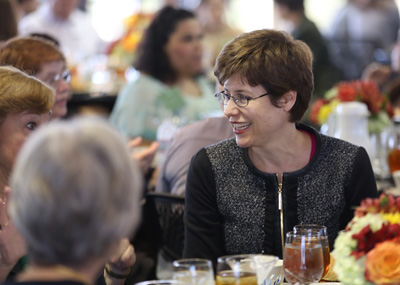By Lori Fogleman
Eliminating poverty and hunger will take the collective commitment of Americans from “many different disciplines, many different walks of life,” Melissa Rogers, a lifelong Baptist who serves as special assistant to the president and executive director of the White House Office of Faith-based and Neighborhood Partnerships, told leaders from anti-hunger organizations and advocacy groups at the Oct. 24-25 Together at the Table Hunger Summit at Baylor University.
Since March, Rogers, a Baylor graduate who formerly worked as director of the Center for Religion and Public Affairs at Wake Forest University Divinity School and before that as general counsel of the Baptist Joint Committee for Religious Liberty, has spearheaded the office that forms partnerships between the federal government and nonprofit organizations — secular and faith-based — to serve Americans in need.
“It’s simple yet powerful, because it recognizes that government services and programs play a key role in serving people in need and so do charities and organizations,” Rogers said. “When we get together and talk about how we can multiply our efforts, something special happens.”
 Rogers spoke at the annual hunger summit organized by the Texas Hunger Initiative, a statewide anti-hunger organization developed within the Baylor School of Social Work in cooperation with the Texas Baptist Christian Life Commission. The Texas Hunger Initiative sponsored the summit in partnership with the USDA.
Rogers spoke at the annual hunger summit organized by the Texas Hunger Initiative, a statewide anti-hunger organization developed within the Baylor School of Social Work in cooperation with the Texas Baptist Christian Life Commission. The Texas Hunger Initiative sponsored the summit in partnership with the USDA.
“Melissa Rogers’ responsibilities for the federal government bring public and private sectors together, understanding the importance and role that faith communities need to be playing in giving us voice, not only giving us voice in federal government but also giving us instruction on how we can move together more cooperatively to have a bigger impact,” said Jeremy Everett, director of the Texas Hunger Initiative.
Offering thanks on behalf of the Obama administration “for the important work that you have done, are doing and will do in the future,” Rogers addressed her office’s robust strategy of partnership — in many cases nonfinancial — with civil society in particular to address the problem of domestic hunger.
She lifted up as a “best practice” the work of the Texas Hunger Initiative and the hunger summits that have raised awareness and the reach of programs that combat hunger. As an example, she noted the summer feeding service program that ensures low-income children continue to receive nutritious meals when school is not in session.
“That is an excellent example of a nonfinancial partnership that our office engages in,” Rogers said. “Those programs and services can’t make a difference to Americans in need unless people know about them. And that’s where it’s so important to have partners who will help us find people in need, help educate them about the benefits and services to which they’re entitled and help us work with and reach people in life-changing ways.”
Everett said if Baptists are serious about “loving our neighbor as ourselves,” they need to be at the helm of fighting hunger and poverty not only in Texas but all over the country and world.
“If we do that, the other sectors will join us. They always have. And in so doing we will be able to see the kingdom of God realized in our day and age.”
